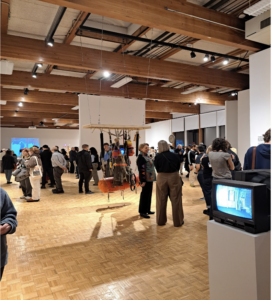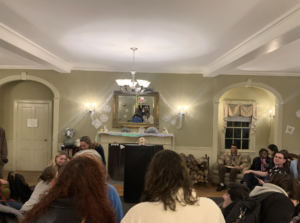Antigone is a young woman who decides that doing what is right is more important than following the rules. Antigone’s brother, Polyneices, has recently been killed in a political/family feud. The king, her soon-to-be father-in-law, Creon has ruled that in order to shame him, Polyneices must remain unburied, dooming his soul to an eternity of unrest. With the punishment for anyone who tries to bury him being death, Antigone’s decision to bury Polyneices is the source of our tragedy. This was where Antigone at Bennington College began.

The devised nature of this performance that allowed the actors to discover the significance of this story was apparent to the audience in every movement they made. The director, Thalia Eddy ‘23, worked to create a world of metaphors and symbology that not just directed the show but directed the audience.
This was apparent in Eddy’s decision to have the audience enter, exactly as the show begins, into a world of tragedy and desperate morality. The terribly beautiful sound of the song “I’ll Fly Away,” being slowly sung as we took our seats, broke our hearts before the first line was uttered. The chorus, played by Muhammad Ammar ‘24 and Sheila Kwake ‘24, began the first scene by telling us what would happen by the end of the show. The inevitability of this tragedy brought tears to our eyes before we even met Antigone, transformatively played by senior Ella Watts ‘22.
Watts’ portrayal of a young woman with exactly one need had more layers than any character I’ve seen with a more complex goal. Watts’ Antigone knew what was right and what was hard and the audience never doubted her decision to do both. We saw her steadfast movement towards what she believed was right. She told everyone around her exactly what she needed to do. Despite the powerful performances of protest delivered with passion by Florence Gill ‘22 as Ismene and Ernesto Cruz-Barriga ‘22 as Haemon, Watts’ Antigone remained strong. Gill’s interpretation of this character delivered the audience into the world of the play through the utter terror of Antigone’s impending doom. Cruz-Barriga’s performance masterfully captured this loss and his eventual death alongside Antigone informed every part of his preceding portrayal.
Creon, played by Ryan Fahey ‘25, was powerful and despicable. We yearned for his mind to change and cried knowing that it never would. His authoritative presence demanded our attention and his scene with Watts challenged our sense of morality. Fahey was so clear about his position that, when his daughter-in-law, son, and wife (Eurydice played by Surabhee Arjunwadkar ‘23) all committed suicide in opposition to his rules, we hated his despair.
Arjunwadkar’s presence throughout the play was a focal point for tragedy. In her silence, we saw the true evil of Creon’s rule. Arjunwadka masterfully demanded our attention and when her character commits suicide, the audience was truly lost for words.
Throughout the show, there were recurring images and patterns. The most distinctive of these was the tap, tap, tapping. From the first moment of the show, each important plot point was denoted by two loud taps. At first, this was jarring and confusing to the audience. As we watch the show, we come to associate them with significance and deep emotion. When Antigone, Haemon, and Eurydice all die, though, Eddy holds off. She has her players give the audience time to mourn until we all realize no tapping has come. Our hearts throb to hear it. We need the catharsis of knowing that their deaths had an impact. When it finally comes, though, nothing was changed. The characters do not come back to life, Creon does not change his rules, and the chorus confronts us about our complicity. How can we just watch as this inevitable story unfolds? How can we not jump out of our seats and scream “stop the show!” How can we live with what happens as the last line was delivered? When the full cast takes the stage for their bows, how can we not give them the standing ovation that they and their director so clearly deserve?

Thomas Finegar is a fourth-year studying morally ambiguous characters in theatre through acting and psychology while writing a thesis on the topic this year. Along with being one of the Editors-in-Chief of the Beacon, Thomas is a Drama SEPC representative and a co-leader of the improv team. He is incredibly excited to be working with the Beacon this year and can’t wait to get publishing!
Co-Editor-in-Chief





Be First to Comment